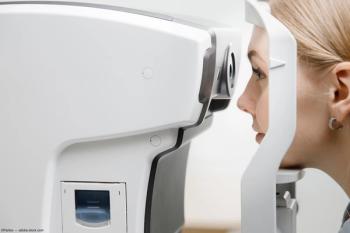
Retina
Latest News
Latest Videos

CME Content
More News

The primary safety endpoint was carried out through the percentage of patients with shift from normal (at baseline) to abnormal in any electrocardiogram (ECG).

The potential gene therapy candidate is being evaluated for geographic atrophy.

The 98 patients included in the study were from a retina outpatient clinic and were using 0.3% ofloxacin eye drops as prophylaxis against infection.

The rationale was that commercial mydriatics administered during retinopathy of prematurity (ROP) screening have been associated with cardiorespiratory and gastrointestinal adverse events.

After reviewing information collected on a patient database, the team suggested telephone prompts for patients with mental health concerns, text message reminders, and online educational tools to improve uptake to increase eye screening attendance.


Brolucizumab significantly improves anatomic parameters of patients with diabetic macular edema.

Researchers described the presence of multiple bilateral serous retinal detachments (SRDs) found in 3 women after they used hair dyes.

The authors searched websites including PubMed, Scopus, MEDLINE, ScienceDirect, and ClinicalTrials.gov, and selected studies based on reports with an association between RVO and heart attack risk.

Researchers set out to determine the most important systemic risk factors associated with cataract development in patients with DM.

The research findings supported the hypothesis that a mild reduction in retinal contrast can slow myopia progression in young children.

Watching out for inevitable degenerative changes can improve patient care.

The primary findings were that a higher BMI was protective against glaucoma progression and use of tobacco and alcohol were not significantly associated with retinal nerve fiber layer change.

Studies point to an inverse association between diabetes and keratoconus risk.

Dr. Carolyn Majcher's lecture on posterior uveitis reinforced the need for optometrists to be vigilant in their diagnostic approach.

AMN, a rare disease, is characterized by dark reddish, wedge-shaped macular lesions.


The company noted that new OPGx-LCA5 Phase 1/2 6-month data demonstrate safety and visual improvement in early onset retinal degeneration.

Oculis Holding AG announces enrollment acceleration for Phase 3 DIAMOND trials for eye drops for DME
The OCS-01 eye drops, which utilize an OPTIREACH formulation of high concentration dexamethasone, are intended to be a non-invasive topical treatment.

An optometrist describes her journey as the first retina optometrist in Colorado.

A recent paper sparks concerns over inadequate screening and management, especially among Black and Hispanic youths, according to its authors.

Brain-to-eye β-amyloid deposits found in ocular glymphatic system in patients with Alzheimer disease
Changes associated with Alzheimer's disease extend beyond the brain, according to a new study.

Because the inner retinal function is thought to affect the emmetropization process, study authors suggested that caffeine may be involved in ocular growth.

CVD could impact physicians' ability to identify choroidal melanoma from choroidal nevus.

Mark Dunbar, OD, FAAO, emphasizes the critical role optometrists play in the collaborative care of diabetic eye disease.























































